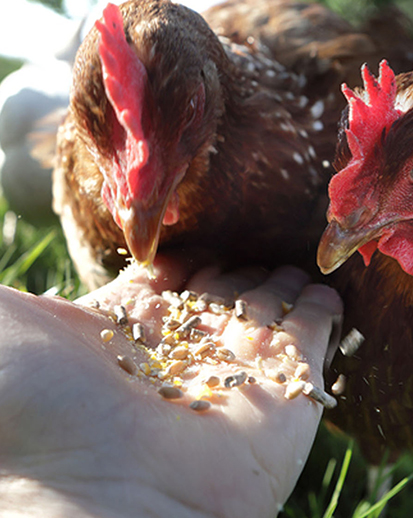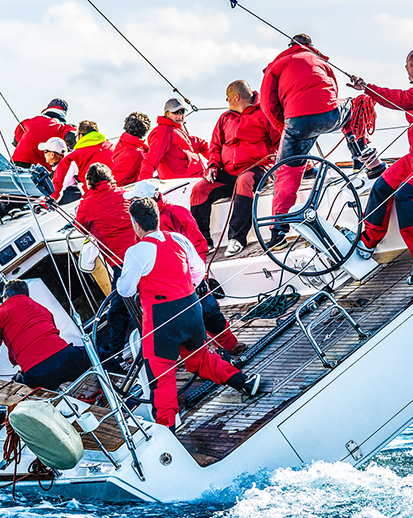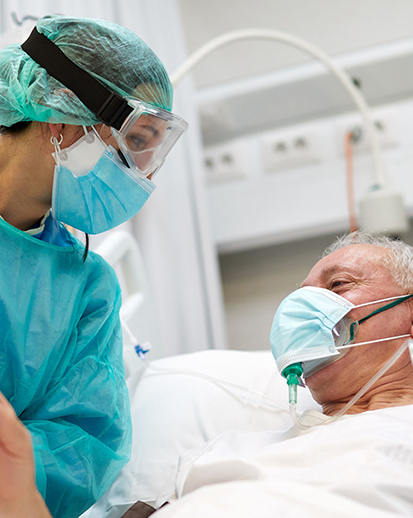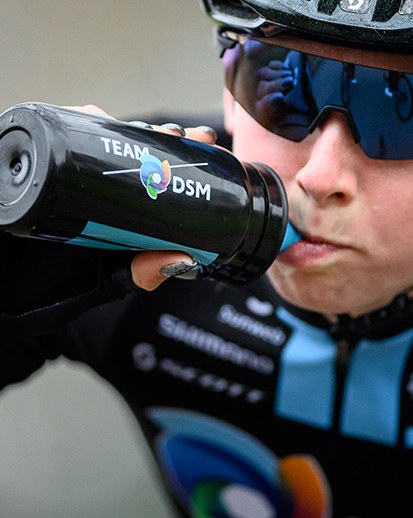Accelerating innovation
Science & Technology
A global, purpose-led leader in biosciences
At DSM, we see science as an important means to transform the sustainability of the global food supply, address climate change, and overcome resource scarcity through circular solutions. Building on 150 years of expertise, DSM today is a global, purpose-led leader in biosciences, developing a broad range of bio-based, sustainable solutions for the food, feed, personal care, pharma, nutrition, agriculture and materials sectors. We are strongly committed to invest in biosciences as key pillar of our future growth. During 2020, we strengthened our global network of world-class R&D and innovations through the acquisitions of CSK, Glycom and Erber Group. In November 2020, we announced the construction of a state-of-the-art Health & Nutrition Innovation Campus in Kaiseraugst (Switzerland) to accelerate innovation in the field of bioscience. This campus will provide modern research laboratories and collaborative workplaces to maximize agile interaction between our scientific competences and business units to further boost our customer-centricity in the development of joint solutions.
Our competences, science network and collaborative approach
Our toolbox of scientific competences is grouped into multiple areas: analytical and data, biological, chemical, engineering, macromolecular, material, and nutritional sciences. These areas are key to our continued success. The Science & Technology department, led by our Chief Technology Officer, works to ensure that we have the right combination of skills, capabilities and partners to deliver on our competences.
We have more than 30 laboratories spread across 10 countries, and our science network comprises about 1,700 internal scientists, including 14 professors and academic associates, distributed around the globe.
These employees co-operate with more than 100 universities and external R&D institutions worldwide, both in public-private partnerships and in academic collaborations such as with the Massachusetts Institute of Technology (MIT) in the United States, East China University of Science and Technology in Shanghai, and Delft University of Technology in the Netherlands.
Our collaborative approach increases our scientific scope and helps us make joint scientific contributions to address significant scientific and societal challenges. We participate in more than 200 academic networks, more than 50 industry networks, and more than 80 public-private partnerships (PPPs) relevant to our innovation growth themes.
Future proofing our R&D and innovation efforts
We are known worldwide as an R&D and innovation powerhouse. To ensure this position and to create greater value for DSM and society at large, we have launched several improvement programs to future-proof our global R&D and innovation efforts.
In 2020, we continued to align our science with the changing needs of the market as well as with the increasing speed of technological and scientific advancements in the world. We have worked towards building a more agile R&D organization that can provide answers to today’s pressing questions with higher speed and precision. We improved our (digital) skillsets and ways of working, in practical as well as technological terms, and created more customer-centric science centers with an increased focus on our innovation growth themes, as described before.
Above all, we have focused on creating an environment where our bright scientists can thrive and focus on doing the right things faster and help realize our collective mission to help address some of the world’s biggest challenges.
Digital transformation of our R&D capabilities
Advanced digital technologies will become more and more critical for capturing new opportunities, and we continue to increase our investments in the digital transformation of our R&D capabilities. This includes making our collective organizational knowledge more easily available across the entire R&D organization, using artificial intelligence (AI), big data, deep learning and modeling, as well as extending lab automation. These investments are accelerating our core processes, increasing our operational efficiency and improving the speed of our innovation processes and delivery. For instance, in 2020 we invested in establishing the AI biosciences research lab ‘AI4B.io’ at Delft University of Technology (Netherlands). This center will develop deep understanding of how artificial intelligence can improve the efficiency and effectiveness of developing bio-based products and production technologies.
x € million |
|
2020 |
|
2019 |
|
|
|
|
|
Nutrition |
|
234 |
|
218 |
Materials |
|
73 |
|
73 |
Innovation Center |
|
60 |
|
57 |
Corporate Activities |
|
11 |
|
13 |
Total continuing operations |
|
378 |
|
361 |
|
|
|
|
|
Discontinued operations |
|
60 |
|
55 |
Total |
|
438 |
|
416 |
|
|
|
|
|
R&D expenditure as % of net sales (continuing operations) |
|
4.7 |
|
4.5 |
Staff employed in R&D activities |
|
1,725 |
|
1,885 |
The Bright Science Awards
We also continue to recognize, reward and nurture scientific talent outside DSM. The Bright Science Awards reward excellence in PhD research in areas of particular interest to DSM’s strategy. The program helps participants make the vital connection between scientific achievement and commercial and industrial success — an increasingly important consideration.
The Scientific Advisory Board
At DSM, we regularly connect with our international Scientific Advisory Board. Acting under the supervision of the Chief Technology Officer, this board provides valuable perspectives and insights, challenges and reviews our scientific work, and gives advice on trends and upcoming disruptive technologies. The Scientific Advisory Board comprises seven internationally recognized experts in the fields of materials, biotechnology and nutrition, drawn from leading universities in the US and Europe.
Scientific Advisory Board
Member
Background
Frank Bates (m)
Regents Professor of Chemical Engineering and Materials Science at the University of Minnesota (USA). His research involves the thermodynamics and dynamics of polymers and polymer mixtures. He has coauthored more than 475 publications and holds more than 25 patents. Nationality: American.
Thomas Hankemeier (m)
Professor of Analytical Biosciences at the Leiden Academic Centre for Drug Research at Leiden University. Medical Delta Professor of Translational Epidemiology at Erasmus MC, Rotterdam. Co-founder of MIMETAS, the first organ-on-a-chip company. He has co-authored more than 320 publications and holds over 10 patents. Nationality: German.
Craig Hawker (m)
Director of the California NanoSystems Institute, Dow Materials Institute, Facility Director of the Materials Research Lab and Alan and Ruth Heeger Professor in Interdisciplinary Science at the University of California, Santa Barbara (USA). He has co-authored over 600 scientific papers and holds more than 75 US patents. Nationality: Australian/American.
Kirk Klasing (m)
Distinguished Professor of Animal Biology in the Department of Animal Science at the University of California, Davis (USA). He is an extensively published expert on poultry nutrition and immunology, with more than 250 peer-reviewed publications, 10 edited books and nine awards to his name for his work in animal biology. Nationality: American.
Wolfgang Marquardt (m)
Chairman of the Board of Forschungszentrum Jülich (Germany), Vice-President of the Helmholtz Association, and Coordinator of the Research Field Key Technologies. He also co-founded AixCAPE e.V., a technology transfer platform in the field of computer-aided process engineering, and its spin-off S-PACT GmbH. He has more than 350 ISI-listed publications. Nationality: German.
Helene McNulty (f)
Director of the Nutrition Innovation Centre for Food and Health (NICHE), a center of excellence for nutrition research, and Professor of Human Nutrition and Dietetics, at Ulster (UK) University. She is an elected Member of the Royal Irish Academy (since 2008) and Fellow of the International Union of Nutritional Sciences (since 2017). Nationality: Irish.
Chris Voigt (m)
D.I.C. Wang Professor of Advanced Biotechnology in the Department of Biological Engineering at Massachusetts Institute of Technology (USA). He is the co-director of the Synthetic Biology Center at MIT and the co-founder of the MIT-Broad Foundry. He is also Editor-in-Chief of ACS Synthetic Biology. Nationality: American.
Internal and external venturing
The Innovation Business Building team creates and develops new business and innovation opportunities for DSM through (external) investments in startups across the globe, (internal) venture-building in DSM, and innovation partnerships with other corporate entities.
External venturing
In 2020, external venturing activities managed through the DSM Venturing organization focused on investing, but also on supporting start-up companies already in our investment portfolio through the turbulent macroeconomic conditions. We made one new external venturing investment in 2020, 18 follow-on investments in 15 portfolio companies, and generated several collaboration leads between start-ups and businesses at DSM. By the end of the year, our portfolio included 35 start-ups (2019: 35). For more information on DSM Venturing, see the company website.
Internal venture-building
In 2020, the Innovation Business Building team developed a way to build and scale innovative ventures at speed by means of a venture-capital approach, dedicated entrepreneurial teams, simple startup-style board governance, and milestone-based funding rounds.
As an example of this new approach, we incorporated DSM PPE Plus BV in the second quarter of the year to coordinate our European materials initiatives in the fight against COVID-19. In September, DSM PPE Plus BV and VDL Group formed a joint venture to manufacture and commercialize medical face masks and personal protective equipment filter materials. Initial production of the face masks began in October 2020. The partners are investing in the construction of new manufacturing facilities for meltblown polypropylene, which are expected to be fully operational in April 2021. More information on this case study of accelerating innovation and collaboration can be found here.
A second example is the creation of Hologram Sciences, Inc. in Boston, which encompasses our activities in personal nutrition within the framework of our Human Nutrition & Health business.
Partnerships
Our partnership with Syngenta for the joint development of microbials for crop protection agents continued successfully in 2020, with the discovery of several biofungicide leads for major plant diseases.
Our ‘proteins of the future’ internal start-up, which established a joint venture with the French agro-industrial group Avril in June 2020 to produce the plant-based protein CanolaPRO™ at commercial scale, was transferred to DSM Food Specialties. It will be brought to market as part of DSM Food Specialties’ dairy and meat alternatives portfolio.
IP & Licensing
IP & Licensing is a global group of qualified IP professionals who protect DSM’s innovations by securing patents and trademarks. This group also includes certified licensing professionals who offer expertise for intellectual property-intensive deals across all DSM businesses, including joint development agreements, technology acquisitions and sales, and in-, out- and cross-licensing deals. DSM filed 260 patents in 2020. This reflects our continued focus on innovation projects with higher potential for business impact.







